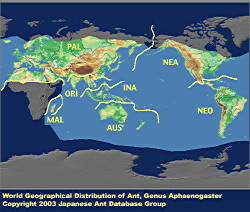
|
genus
|
Aphaenogaster
|
 |
Japanese Name
|
Ashinaga-ari-zoku
|
Description
|
|
Medium- to large-sized ants. Body slender; legs long. Antennae 12-segmented; apical 4 (or rarely 5) segments elongate and forming an obscure club, which is shorter than the length of the remaining funiculus. Metanotal groove distinct; propodeum with spinose processes.
|
|

|
Remarks
|
|
Aphaenogaster is distributed almost world-wide except in the Afrotropical region. Emery (1921) listed 55 species in 5 subgenera, but the actual number of species in nature must far exceed his tally. Species-level taxonomy is difficult, since morphological distinctions can be subtle, and chromosomal polymorphism in American species (Crozier, 1977) implies the presence of sibling species elsewhere. Fifteen Japanese Aphaenogaster species are now recognized, but overall taxonomic understanding is incomplete.
The fauna is richest in the Ryukyus. The Japanese species are found in forested areas and nest in the soil, except for Aphaenogaster osimensis which is found in open, rocky, seashore habitats. To date all known species are monogynous and worker polymorphism has not been observed. Workers of some species walk with their gasters bent downwards. "A List of the Ants of Japan with Common Japanese Names" (Myrmecological Society of Japan Editorial Committee, 1988) nominated 7 Japanese species (4 described and 3 nomenclaturally undetermined). Nishizono & Yamane (1990) have subsequently named the subspecies A. famelica erabu, and Watanabe & Yamane (1990) described 10 new species (including the 3 nomenclaturally undetermined forms mentioned above). It should be noted that the workers of founding and young colonies have relatively elongate heads and weakly-developed sculpturation, so they can appear to be of species different from workers in conspecific mature colonies. For the correct identification at species level, comparison of workers of different size classes from single colonies is necessary.
|
References
|
|
- Emery, C. (1921). Hymenoptera, fam. Formicidae, subfam. Myrmicinae. . In P. Wytsman, ed., ""Genera Insectorum"", fasc. , 174A, 1-94. .
- Crozier, R. H. (1977). Genetic differentiation between populations of the ant Aphaenogaster 'rudis' in the southeastern United States. . Genetica, 47, 17-36.
- Myrmecological Society of Japan, Editorial Committee (ed.) (Ed.). (1988). A list of the ants of Japan with common Japanese names. The Myrmecological Society of Japan, Tokyo.
- Nishizono, Y. & Sk. Yamane (1990). The genus Aphaenogaster (Hymenoptera, Formicidae) in Kagoshima-ken, southern Japan. . Rep. Fac. Sci. Kagoshima Univ. (Earth Sci. & Biol.), 23, 40.
- Terayama, 1999
- Watanabe & Yamane, 1999
- Yamane, 1996
|
Editor
|
|
Original text by Hirofumi Watanabe and Seiki Yamane. English translation by Kazuo Ogata, edited by Robert W. Taylor.
|
|